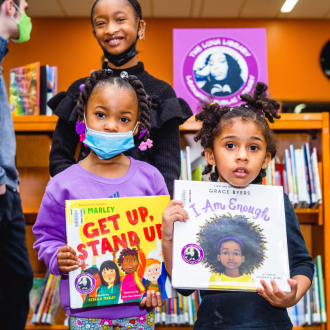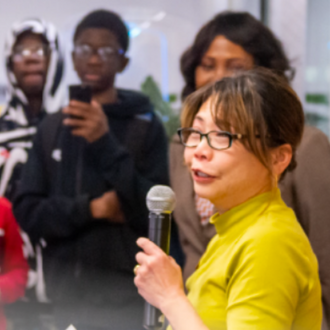Guiding Public Libraries in Racial Equity to Achieve Racial Justice

Written by Michelle Hamiel, Director of Racial Equity and Community Impact, Urban Libraries Council
"Racial equity is about applying justice and a little bit of common sense to a system that's been out of balance. When a system is out of balance, people of color feel the impacts most acutely, but to be clear, an imbalanced system makes all of us pay."
Glenn Harris, President, Race Forward and Publisher, Colorlines
As an African American woman, I have never felt privileged while recognizing my privileges. As a woman of color and an executive I have felt the impact of out of balanced systems.
More than 35 years ago, I started my career in a library system where my mother had worked in an executive office and was well respected. The library director was a Black woman. My first library manager was a white man, an ally who encouraged me, supported me and provided incredible opportunities to me as a library associate. In this system I saw many African American managers making a difference in the Black communities they served. The library collections reflected the communities. There was a wide range of African American authors in the book collection. There was ongoing African American programming, not just during Black History Month.
Later on, I was transferred to another branch and I had the privilege of working with a manager who said, "When the people don’t come to us, we go to them." In 1985, this library system was providing racially equitable programs and services. Their racially equitable hiring practices led to a staff that looked like the community they served. It was because of this system that I wanted to become a library director.
I naively believed this practice of racial equity in libraries was the norm.
Joining another urban system, I had great mentors and a couple of white allies, but I had no Black managers and I did not see anyone in leadership who looked like me. An African American director in another system told me not to let the organization pigeonhole me. That was when I realized I was always being asked to weigh in on what administration thought was a “Black matter,” like whether they should buy urban fiction or if we still needed to carry Jet magazine. Never was I asked to weigh in on IT questions or other “non-Black” collection concerns. I never hesitated to lend my voice to inequities. It was there I began to — had to — walk down the Equity, Diversity and Inclusion path.
Becoming an executive in another system taught me that racial inequity exists on an even higher plane. Libraries, supposedly neutral “bastions of democracy,” struggled with racial equity, and continue to do so today.
So what does racial equity in libraries look like?
Internally, it is when Black and Brown people have a seat at the administrative/executive table and while at the table, their voices are truly heard, received and valued.
It is when executive teams begin dismantling institutional racism by examining, recognizing and managing personal biases, and eliminating inequitable policies, procedures and practices that create barriers to success and often contribute to traumatic experiences.
It is when library managers and staff at all levels look like the communities they serve. That means hiring practices must change and job qualifications may need to be reimagined.
It is when Black and Brown people are valued and respected to work not just in Black and Brown communities but in any community. Black and Brown people are given the tools, resources, opportunities and support to advance.
A racially equitable library will have a framework or a strategic plan with a clear mission and vision. It will lead the organization’s internal and external work and will layout expectations, so all staff understand what is expected of them in the library ecosystem. This framework should guide how library staff show up for each other and their communities in a relevant way. Every aspect of this framework must be examined and reexamined to ensure it remains relevant. Most importantly, the plan must be sustainable.
The year 2020 laid bare the nasty wounds of racism, racial disparities and racial inequities. I would have thought we would have moved from racial equity to racial justice by now.
Brooks Rainwater, CEO Urban Libraries Council, and I had a conversation that led to my wondering if we would see racial justice in our lifetime. Thank goodness racial equity, and racial justice are still priorities for ULC.
While I still do not feel privileged in the library world, as ULC's Director of Racial Equity and Community Impact, I am honored to work alongside outstanding library leaders who are doing amazing anti-racism and racial equity work. I am honored to lead ULC's Anti-Racism and Digital Equity action teams, without whom we would not have been able to develop the benchmarks for Edge, ULC's benchmark program. I am also leading the Equity Diversity, and Inclusion Member Group, a safe space where EDI directors, chiefs, officers and staff can rely on each other to help move racial equity forward.
Though I may not feel privileged, I recognize the opportunity afforded to me of having worked in a place more than 35 years ago where management and executives looked like me. Because of that system I know what is possible, and I am willing to stand at the Urban Libraries Council to work for and with phenomenal library leaders fighting the good fight every day to dismantle institutional racism to move libraries from racial equity to racial justice.
Michelle Hamiel, Director of Racial Equity and Community Impact
Resources:
Trigger Terms: Harmful Detours and Healing Redirects
Addressing key trigger terms in the current media, social and political climates, ULC’s Harmful Detours and Healing Redirects framework is designed to help leaders grow alignment, surface misunderstandings and find paths forward through difficult conversations. Each term listed below includes examples of interpretations that can derail productive conversations (“harmful detours”) as well as suggested language to foster mutual respect and understanding (“healing redirects”).
Learn More
Related Articles

Lexington Public Library & Luna Library: Celebrating and Creating Black History
Learn more about the launch of the Luna Library, a special collection of children’s books within LPL’s catalog featuring titles by, for and about Black people named in memory of Kamaria Spaulding.
Learn More

How Howard County Library System’s New Racial Equity Initiative Fosters Brave Voices, Brave Choices
Discover how Howard County Library System's new Brave Voices, Brave Choices initiative is helping the library act on its commitment to move past statements and begin the work of creating a more just and equitable reality.
